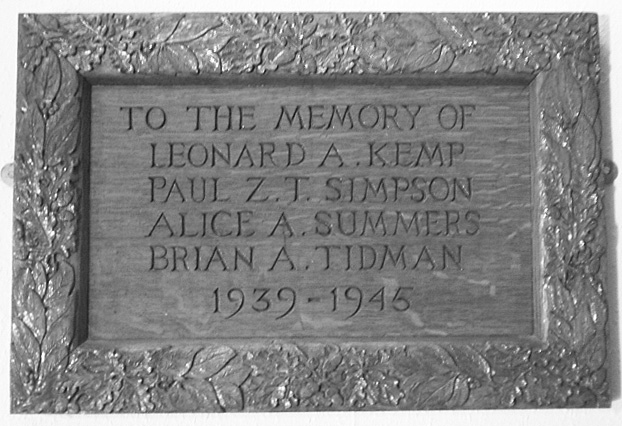History
South Green Memorial Hall It’s Origins and Meaning
South Green During the Second World War
South Green along with most towns and villages in South East Essex, experienced the effects of numerous air raids throughout the course of the war. This was mainly due to jettisoned bombs from the Luftwaffe, returning home after raiding London. Our location being near the Thames, which was the main navigational aid to and from the North Sea into the heart of London. South Green was fortunate, casualties from these raids were relatively light, although damage to property was extensive in some cases.
Four residents of South Green died as a result of the Second World War, three servicemen and one civilian. The few details known about each of them follows.
Leonard Kemp
The son of Mr. & Mrs. Victor Kemp of Barleylands Cottages was killed in action during the Normandy Landings on D-Day, 6th June 1944.
In a letter to his parents his commanding officer wrote: “his tank (of which he was a gunner) was hit by an 88mm shell, only a few seconds after he had been congratulated by his commander on knocking out an extremely active gun position”. He went on to add that: “Len died a brave soldier and his coolness in a desperate situation was an example to all.” The rest of the tank crew suffered injuries.
Alice Summers
On 24th February 1945, the Billericay Times reported the sudden death of Mrs. Alice Summers, 75 years old of “Sweet Briar”, Mill Road. Her death was due to enemy action which occurred sometime prior to this date. She had resided in South Green for twenty seven years, having previously lived at Edmonton. Her husband Mr. J. Summers was the first Labour councillor to be elected for Edmonton Council.
Tragically Mr. J. Summers was found drowned in a gravel pit at Mucking within a month of his wife’s death. An open verdict was recorded.

Brian Tidman and Paul Simpson
In Great Burstead churchyard, one of the twelve war graves records the following details: Sergeant Pilot B.A. Tidman R.A.F. killed 22nd November 1942 aged 21.
It is thought that Brian lost his life crash landing his aircraft somewhere in Wales.
At the foot of his grave is a small inscription which reads: in memory of his pal Paul Simpson killed 27th May 1942 aged 22 years. Paul’s father the Reverend E.J. Simpson was the vicar of Great Burstead church from 1933 until 1946.
During the “VE Day” celebrations at South Green a group of local residents discussed ways by which the memory of these four people could be best remembered. After much discussion the idea of building a social centre with facilities for sports, dances, meetings etc., was considered to be an ideal way of providing a lasting tribute to their memory. This idea provided the origins of South Green Memorial Hall.
This group of residents formed a fund-raising committee, establishing the South Green Memorial Fund. The Billericay Times on 2nd June 1945, reported the formation of this committee, listing the following members:
Chairman
- Mr. J Fennell
Secretary
- Sue Moore
Trustees
- H Outen
- D Grieg
- C H Weedon
- A T Tidman
Members
- Mrs. M Crow
- R H Rust
- A Boughtwood
- D Cook
- A Walden
- H W Truss
- C Burt
Fund-raising events were planned using the Green for various functions. The initial fund-raising event occurred on Saturday 25th July 1945, when £21, was raised from a dance held on the Green. The first fete was also held on the Green on 7th July 1945 when over 1,000 people attended. Many other fund-raising events were held on the green and at the Archer Memorial Hall during the winter months. By 1948 enough money was raised to purchase a site for the Hall. The land was purchased from Mr H.W. Truss on 22nd June 1948 for £298. Plans were drawn up for consideration by the committee, but rising costs outpaced contributions to the fund and the scheme was delayed. Building work eventually started in 1955 and the Hall was completed at the cost of £2,205.
On Saturday 7th July 1956, the Hall was opened with a fete to commemorate the event. The opening ceremony was carried out by Mr. H. Bent-Marshall. Before declaring the Hall open, Mr. Bent-Marshall said: “I feel that we must mention with appreciation those who have worked so hard and to you all who have given your support so that this Hall could be built.
The idea was born of a desire to remember the brave men who sacrificed every thing, that our England should remain our England, and most surely they would be happy that you have built a memorial, where those they loved can meet and make friends on occasions. We must never forget for one moment those unselfish men and we must pay unending tribute to them and their families for all they sacrificed.” Mr. Bent-Marshall then cut the tape across the doorway.
The first event held in the hall was a whist drive on the opening evening.
